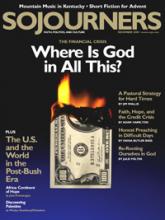With many more Americans struggling to pay for food and housing, the upcoming commercial holiday season may by necessity be a time for soul-searching and creative generosity.
For the past few decades, the day after Thanksgiving has been promoted as Black Friday, a one-day ritual of shopping frenzy. Underlying the news stories of people lined up outside big box stores hours before opening was the suggestion that if enough of us believed and bought and made a flagrant offering of our credit cards, retailers’ account books would mystically turn from red to black. Our faithfulness would be rewarded with the implicit promise of stuff enough for all and forever.
Since the 1990s, Adbusters magazine and others have waged a guerrilla campaign to change Black Friday into Buy Nothing Day. But after months of economic turmoil, buying nothing is a given for many people. Loading up a shopping cart with electronics isn’t an option, much less a temptation. When financial institutions crack at the foundation and temples to false gods crumble, the fleeting nature of materialism’s comfort that the Buy Nothing folks warn about is made manifest.
Fearless Generosity
Even if our own situation seems secure, how can we not feel some fear and despair for those who are suffering—especially the poorest of the world’s poor, who risk starvation and bury far too many of their children even when our times are good? While we’re told wealth will trickle down, scarcity seems much more responsive to gravity, as the financial crisis among the rich nations threatens promised aid to developing countries. Some estimates are that the ranks of the hungry may grow by as many as 100 million people due to continuing record food and energy prices.
So how do we re-root ourselves in God to be vessels of perfect love that casts out fear (1 John 4:18)?
Read the Full Article

